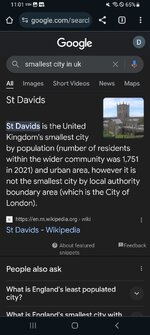City status in the UK can be associated with having a cathedral or a university, a particular form of local government, or having a large population.
Although any of these might be used to justify the popular use of the term ‘city’, in formal terms UK city status is granted by the monarch, on the advice of ministers.
In recent decades, city status has been granted following a structured decision-making process. However, many UK cities can date gaining city status back to a charter several hundred years ago. A small number, such as London, claim city status from ‘time immemorial’.
This Insight examines how a place becomes a city, whether ceremonial and local government structures signify a city status, and how city status can be lost.
The significance of a ‘city council’
Local government structures, despite their names, do not have a direct connection to whether somewhere has the status of a city.
A city will normally style its local authority as a ‘city council’, but this is not a category of local authority in its own right. In law, a city council could be a unitary authority (eg Manchester), a district council (eg Cambridge), or a parish council (eg Truro).
City status is distinct from the periodic reforms to local government structures in legislation such as the
Municipal Corporations Act 1835, the local government acts of the late 1880s and early 1890s, and the local government acts of 1972 (England and Wales) and 1973 (Scotland). Some provisions in those acts led to the reform of city corporations and councils. But for the most part they did not affect city status.
In 2022 the Government published an official
list of cities, including indicating cities which have a lord mayoralty or lord provostship.
What about cathedrals?
Historically, cities were settlements with a cathedral, and those places remain cities. Therefore, many settlements that are now comparatively small, such as Ely, Wells, or Salisbury, have long had city status. A cathedral is not a requirement for city status to be conferred, though Birmingham was the first town without a cathedral to become a city, in 1889.
How to become a city
In recent decades, city status has been granted through a series of competitive bids, managed by the Ministry of Housing, Communities and Local Government (or its predecessors). The Government announced a
Platinum Jubilee competition for civic honours in June 2021. Applicants could seek city status or a Lord Mayoralty (or Provostship in Scotland).
In May 2022,
eight places were awarded city status. These were Bangor (Northern Ireland), Colchester, Doncaster, Dunfermline, Milton Keynes, and Wrexham: and also Douglas (Isle of Man) and Stanley (in the Falkland Islands). Southampton was awarded a lord mayoralty.
Following the murder of Sir David Amess in October 2021, the Prime Minister announced on 18 October that
Southend-on-Sea would be awarded city status in his honour. Southend had planned to apply for the 2022 competition.
Before the 2022 competition, the most recent competitions were:
Though many towns continue to aspire to city status, there is no mechanism for them to make ‘unsolicited bids’ to gain it.
City status is officially granted by ‘letters patent’ – meaning a document that is officially issued by the monarch. The text used can be found on page 25 of the Crown Office’s
General Guidance for Warrants and Patents (PDF).
What if there is a lord mayor?
City (and borough) councils will normally appoint a mayor. The mayor is usually the chair of the council and holds ceremonial duties related to the council and to the city or town. This type of mayor is often seen in public wearing gold chains or other items related to their office.
Some city mayors are entitled to style themselves ‘Lord Mayor’, via letters patent granted by the monarch. These have been most recently granted to
Chester (1992),
Exeter (2002), and
Armagh (2012). Having a lord mayor is not an indicator that a place has city status.
Lord mayors are
not the same as directly-elected
executive mayors existing in some English local authorities (such as London or Greater Manchester). Our briefing on
directly-elected mayors has more information on those.
Can a place lose its city status?
Some areas have lost their city status.
Rochester lost its individual city status following the 1974 local government reorganisation, when it merged with Chatham to form Medway Borough Council. Letters patent were granted at this time extending the city charter to the whole of the new borough council area. In January 1982, special letters patent were issued giving city status to the “City of Rochester-upon-Medway.”
A further local government reorganisation in 1998 merged the new council with the then Gillingham Borough Council to form the current Medway unitary authority. Medway Council papers from 2003 state that at this point: “
a conscious decision was made by the former Rochester upon Medway City Council not to proceed to make the appointment of Charter trustees” (PDF 14.6 KB). Charter trustees are a legal creation that maintains city status on behalf of a locality that does not have its own district or town council.
In other cases, city status has been lost and then regained. In the book,
City Status in the British Isles 1830-2002, John Beckett shows how Hereford lost its city status briefly in 2000, when its charter trustees were merged into a new city (parish) council in April. City status was restored via letters patent on 9 October.
St David’s, in Pembrokeshire,
lost its city status in 1886 following a local government reorganisation. Its borough corporation was in practice defunct at this point and therefore there was no way of opposing this decision. The same happened to Armagh, in Northern Ireland, in 1840. In 1994
the Queen granted city status to both places again, “in recognition of their important Christian heritage and their status as cities in the last century”

